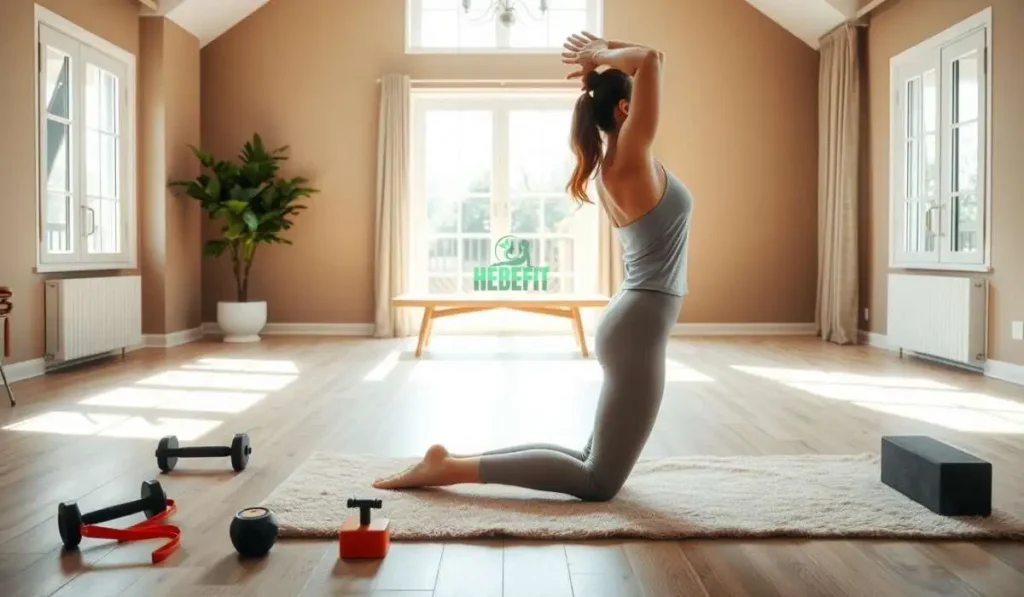Feeling sluggish in the mornings? Starting your day with a good morning exercise routine can change everything. A simple morning exercise can boost your energy, sharpen your focus and start your day off right.

Imagine starting your day feeling refreshed and energized. A good morning exercise routine can make that happen. In this article, we’ll look at the benefits of morning exercise and share a simple routine to get you going.
Key Takeaways
- Boost your energy levels with a morning exercise routine
- Improve your focus and mental clarity
- Enhance your overall physical and mental well-being
- Set a positive tone for the day ahead
- Simple and effective morning exercise routines for beginners
What Is a Good Morning Exercise?
Understanding the good morning exercise is key for strengthening your back and hamstrings. It’s a compound movement that works several muscle groups. You bend at the hips and knees, keep your back straight, and then stand up.
Definition of Good Morning Exercise
The good morning exercise strengthens the back, glutes, and hamstrings. It’s called “good morning” because it looks like bowing. You start standing, bend, and then stand up again, keeping your back straight.

Why It’s a Powerful Move for Your Back and Hamstrings
This exercise is great for your back and hamstrings because it works many muscles at once. Bending at the hips and knees activates your hamstrings and glutes. Keeping your back straight works your back muscles. This makes it good for better athletic performance and strength.
History and Popularity Among Fitness Experts
The good morning exercise has been around for decades and is loved by fitness experts. It’s good for improving flexibility, strength, and athletic performance. That’s why it’s in many workout routines, from strength training to athletic conditioning.
Good Morning Exercise
The good morning exercise is great for all fitness levels. It strengthens your back, hamstrings, and core. Knowing how to do it right is key for safety and effectiveness.
The mechanics of the movement
When doing the good morning exercise, bend at the hips. Keep your knees a bit bent and your back straight. This targets your hamstrings, glutes, and lower back.
To do it right, keep your back straight and your core tight. This helps you get the most out of the exercise.
When and how to include it in your routine
You can add the good morning exercise to your routine in many ways. Think about your fitness goals and current level. For strength training, add it to your lower body or full-body workouts.
Equipment you can use
You can use different equipment for the good morning exercise. This makes it easy for everyone to join in. Here are some options:
- Bodyweight: Great for beginners or those who want a light workout.
- Resistance bands: Provides extra challenge and is easy to use anywhere.
- Barbells: Perfect for those who want to lift heavier weights.

| Equipment | Difficulty Level | Best For |
| Bodyweight | Low | Beginners, low-intensity workout |
| Resistance Bands | Moderate | Those looking for added resistance without heavy weights |
| Barbells | High | Strength training enthusiasts, advanced lifters |
Learning about the good morning exercise can boost your strength and flexibility. It’s a great addition to any fitness routine.
Seated Good Morning Exercise: A Beginner-Friendly Variation
If you’re new to strength training, the seated good morning exercise is perfect. It’s great for those who find the standing version hard on their lower back.
Who Should Try the Seated Version?
The seated version is great for beginners. It’s also good for people with lower back pain or injuries from the standing version. It helps work on your hamstrings and back muscles without too much strain on your lower back.
Benefits of Seated vs. Standing Good Morning
The seated version has big advantages over standing. It puts less strain on your lower back, making it easier for those who need to avoid it. It also focuses more on your hamstrings and upper back, improving flexibility and strength.
Easy Step-by-Step Instructions
To do the seated good morning exercise, just follow these steps:
- Sit on a chair or bench with your feet flat on the floor, shoulder-width apart.
- Keep your back straight and core engaged.
- Slowly lean forward at the hips, keeping your back straight, until you feel a stretch in your hamstrings and lower back.
- Return to the starting position by hinging at the hips and straightening up.
Begin with a light weight or no weight at all. As you get more comfortable, you can add more resistance.
Good Morning Exercise Benefits: Why You Should Add It to Your Routine
The good morning exercise is a great addition to any workout. It boosts strength, flexibility, and overall health. Adding it to your routine can make a big difference in your fitness.
Boosts Lower Back and Core Strength
This exercise is great for strengthening your lower back and core. It helps improve stability and lowers injury risk. A stronger core and lower back also help with better posture and less strain on your body.
Helps Improve Flexibility and Posture
The good morning exercise also boosts flexibility, especially in the hamstrings and lower back. This can lead to better posture as your muscles support your spine. Regular practice can also reduce muscle tension and improve mobility.
Supports Injury Prevention in Everyday Movements
By strengthening muscles and improving flexibility, the good morning exercise helps prevent injuries. A stronger and more flexible lower back and core can better handle daily stresses. This makes it a great choice for anyone who is active.
| Benefits | Description |
| Lower Back and Core Strength | Improves stability and reduces injury risk |
| Flexibility and Posture | Enhances flexibility and promotes better posture |
| Injury Prevention | Reduces the likelihood of injury during daily activities |
Can I Do Full Body Workout Every Day?
You might wonder if doing a full-body workout every day is possible. It depends on your fitness goals, current fitness level, and how your body recovers. Good mornings are a key part of this routine.
Should Good Mornings Be Done Daily?
Doing good morning exercises every day can be harmful if not done right. It targets the hamstrings, glutes, and lower back. But, doing too much can cause overtraining and injury. It’s crucial to balance exercise with rest.
Understanding Rest and Muscle Recovery
Rest and recovery are as important as the workout. Full-body workouts cause micro-tears in muscles. Adequate rest helps your body repair and strengthen these muscles.
Without enough recovery time, you risk overtraining. This can lower your performance and increase injury risk. It’s wise to have at least one or two rest days a week, depending on workout intensity.
“Recovery is just as important as the workout itself. Without adequate rest, you’re not giving your muscles the chance to repair and grow stronger.”
Tips on Alternating Full Body and Focused Routines
To avoid overtraining, alternate between full-body workouts and focused routines. For example, do full-body workouts three times a week. Use other days for exercises targeting specific muscles.
This mix keeps you fit while allowing muscles to recover. Adding variety in your workout routine also prevents plateaus and keeps workouts interesting. Change the intensity, volume, or type of exercises you do.
For instance, one week focus on high-intensity workouts. The next week, reduce intensity and focus on recovery.
Whether you can do a full-body workout every day depends on your goals, fitness level, and body’s response. Listen to your body and adjust your routine for a balanced workout.
How to Do Good Morning Exercise
To get the most out of the good morning exercise, it’s crucial to understand the correct technique. This involves not just the movement itself, but also how to prepare your body and avoid common pitfalls.
Warm-up Tips Before Starting
Before diving into the good morning exercise, a proper warm-up is essential. Start with light cardio like jogging in place or cycling. Then, do dynamic stretching to loosen up your muscles, especially in your back, hamstrings, and glutes.
Examples of dynamic stretches include leg swings, arm circles, and torso twists. Warming up increases blood flow to your muscles, making them more receptive to the exercise. This reduces the risk of injury and improves your performance.
Correct Form With and Without Weights
When performing the good morning exercise, maintaining correct form is paramount. Whether you’re using weights or doing the exercise with body weight only, the principles remain the same.
Start by standing with your feet shoulder-width apart, toes pointing forward or slightly outward. If using weights, hold them at your hips or shoulders, depending on the variation you’re performing. Keep your back straight, engage your core, and slightly bend your knees.
As you hinge forward at the hips, keep your back straight and your core engaged. Lower your torso until you feel a stretch in your hamstrings, then return to the starting position. Avoid rounding your back or letting your knees extend too far forward.
Common Mistakes to Avoid When Performing the Good Morning Exercise With Weights
When adding weights to your good morning exercise, it’s easy to fall into bad habits. Common mistakes include using too much weight, not engaging the core, and allowing the back to round. To avoid these pitfalls, focus on controlled movements and progressive overload, gradually increasing the weight as your form and strength improve.
By being mindful of these factors, you can ensure that you’re getting the most out of your good morning exercise while minimizing the risk of injury.
Final Thoughts: on Good Morning Exercise
Incorporating the good morning exercise into your morning routine can change your fitness game. It targets your back and hamstrings, boosting strength, flexibility, and posture. It’s a great addition to your weekly workout plan.
Easy to Start, Powerful Results
Adding the good morning exercise to your routine is easy, whether you’re new or experienced. Start with the right form and gradually get more intense. You’ll see big improvements in your fitness.
Add to Your Weekly Workout Plan
Adding the good morning exercise to your fitness routine strengthens your lower back and core. It’s a key part of a balanced morning workout. It helps prevent injuries and improves daily movements.
Consult a Trainer for Best Practice
For the best results, talk to a fitness trainer to make the good morning exercise fit your needs. With regular practice and correct form, you’ll unlock its full benefits. This will take your fitness journey to new heights, giving you valuable tips.
FAQs
What is the good morning exercise, and how does it work?
The good morning exercise works many muscles at once. It targets the back, hamstrings, and glutes. You bend at the hips and knees, keeping your back straight, then stand up again.
What are the benefits of incorporating the good morning exercise into my routine?
This exercise boosts strength, flexibility, and posture. It also helps prevent injuries by strengthening muscles and improving joint mobility.
Can I perform the good morning exercise daily?
It’s tempting to work out every day, but rest is key. Daily full-body workouts can be tough and might not give muscles enough time to recover. It’s better to alternate between full-body workouts and focused routines.
How do I perform the good morning exercise correctly?
Start with a warm-up. Keep the right form, with or without weights. Avoid rounding your back or using too much weight.
Can I do the good morning exercise with equipment like resistance bands or barbells?
Yes, you can use bodyweight, resistance bands, or barbells. This makes the exercise accessible to everyone, regardless of fitness level or preference.
Is the seated good morning exercise a good alternative for beginners?
Yes, it’s easier on the lower back. It’s great for beginners or those who find the standing version uncomfortable.
How can I incorporate the good morning exercise into my workout routine?
You can do it as a standalone exercise or part of a bigger workout. Think about your fitness goals and current level to decide how to include it.
Should I consult a trainer before starting the good morning exercise?
For the best results, get a fitness trainer. They can make sure you’re doing it right and tailor it to your needs.










